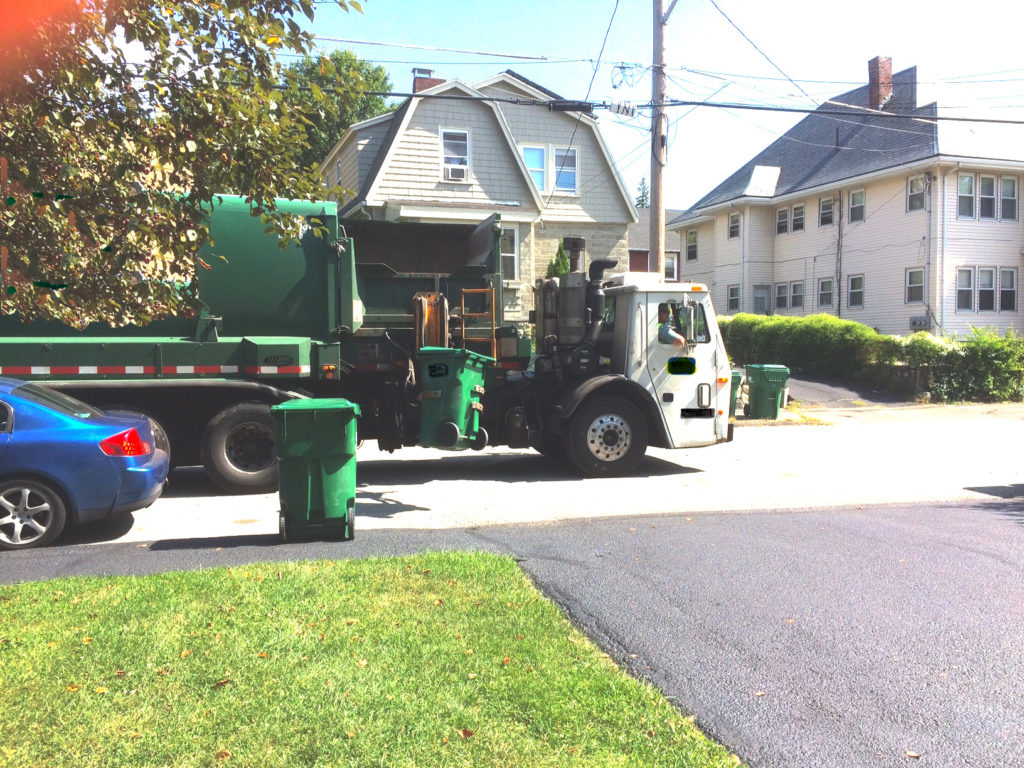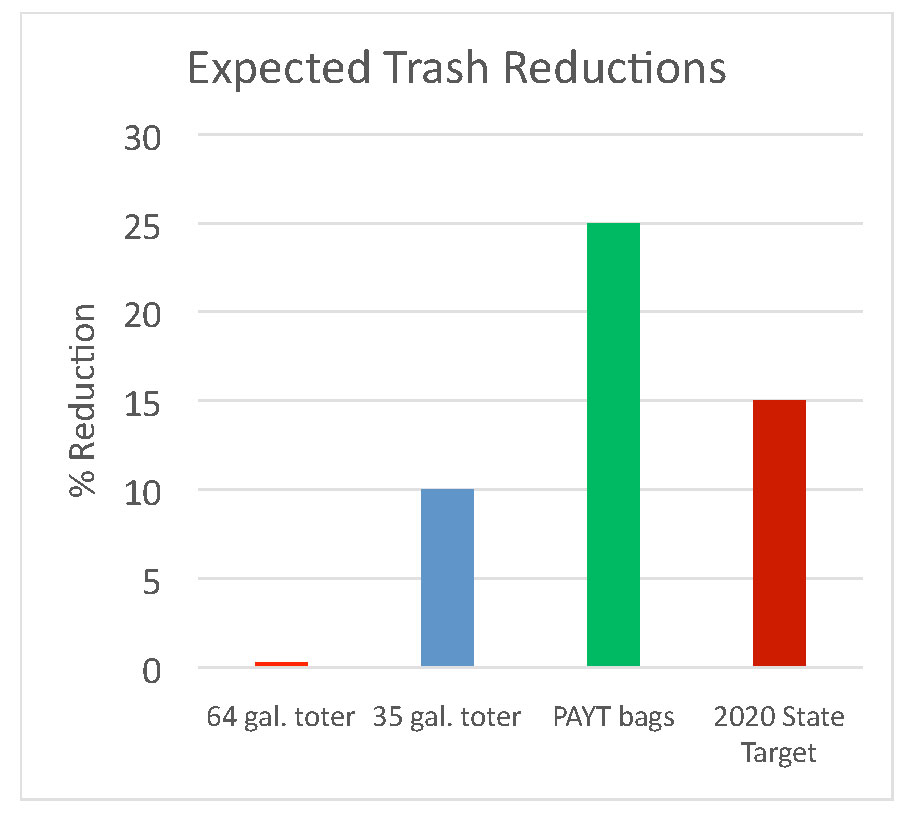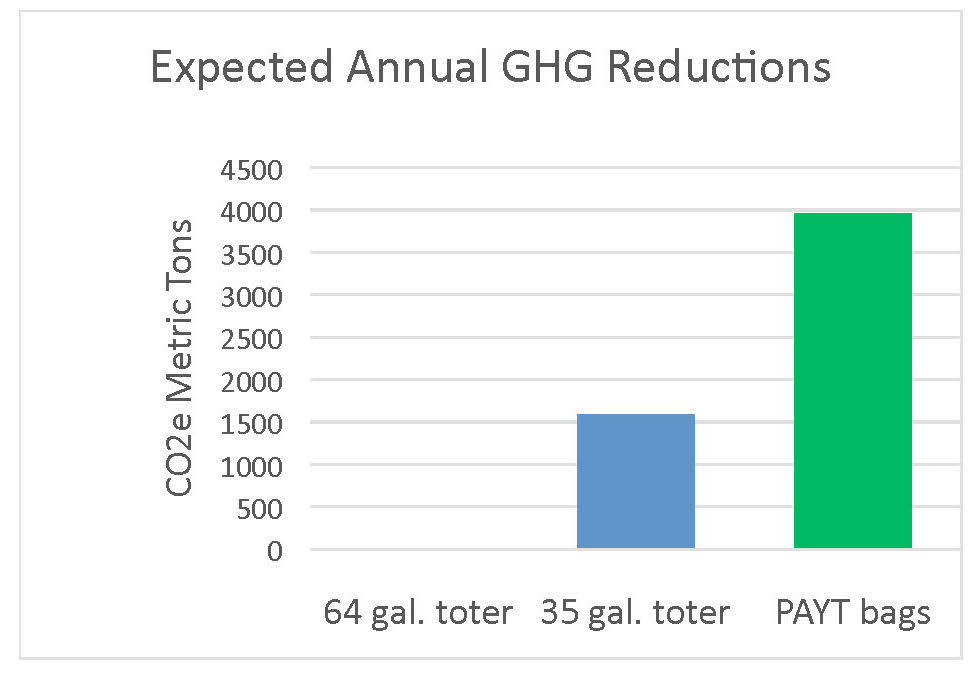
As Belmont prepares to put its its trash and recycling contract out for bid, the author analyzes four possible options.
Town Hearing Set for September 25
by Kim Slack
This fall, Belmont will be negotiating a new contract for trash and recycling collection with interested haulers, to begin in July 2018. Now is an optimal time to consider other options for how Belmont deals with its trash. There are many urgent reasons that suggest that we change how we deal with our trash.
Along with fellow members of the Sustainable Belmont Advisory Group, I evaluated several options. We encourage the public to voice their views at a meeting on September 25 at Town Hall.
The state has set a goal that calls on communities to reduce their trash by 30% by 2020. Belmont is just halfway there.
According to the Massachusetts Department of Environmental Protection (MA DEP), only 11% of Massachusetts towns use systems like Belmont’s: unlimited trash collection paid entirely by property taxes. This makes Belmont’s trash system especially expensive at a time when the town’s finances are becoming strained. According to the Warrant Committee, Belmont will face a $4 million annual budget deficit in less than two years, not including the cost of a new high school. By law, Belmont must have a balanced budget.
Future disposal costs may bring increases. Casella, a waste management firm that operates many landfills and recycling facilities in New England, anticipates a 20% reduction in the region’s disposal capacity over the next several years. MA DEP anticipates an 8.6% reduction of in-state disposal capacity between 2016–2018.
There is urgency to the matter because, as part of its 2009 Climate Action Plan, Belmont established goals for reducing greenhouse gas emissions. The town has made limited progress towards these goals despite the push by residents for many green initiatives: revised solar policies, advocating for the purchase of electric vehicles, becoming a certified Green Community, and supporting a community path. Waste reduction, which can have a significant impact on reducing emissions, would be a key element in meeting our goals.
Further, through the 2008 Global Warming Solutions Act, the state has set a goal that calls on communities to reduce their trash by 30% by 2020. Belmont is just halfway there.
Recognizing that funds saved on trash disposal could be applied to mitigate taxes in other areas, Belmont’s Town Meeting this year voted 62% in favor of seriously considering a Pay-As-You-Throw (PAYT) approach, despite reminders that a 1990 town override vote was intended in part to continue “free” trash pickup paid entirely with property taxes.
In reviewing Belmont’s trash and recycling contracts this fall, the selectmen have an opportunity to guide the town to consider better options that will address our overall needs and goals for both fiscally responsible and environmentally sound policy.
Here are two options on how Belmont could save money on trash and recycling:
1. Reducing Waste
We can achieve the greatest savings by simply reducing the amount of trash we generate. A lower volume reduces the disposal costs the town pays to the Wheelabrator incinerator in North Andover. We currently pay $65/ton to burn trash and dispose of the ash. Waste can be reduced most efficiently by either limiting trash barrel size (e.g., one 35-gallon barrel per household) or by requiring residents to purchase trash bags at a higher price, the PAYT option. Each approach results in different amounts of waste saved (see Figure 1, page 7).
Because Belmont produces below-average amounts of household trash to start with, it can expect less-dramatic reductions than towns that generate more trash.

Many communities use the “automated” system of a collection truck that can pick up and dump a “toter” with a single operator never leaving the cab of the truck.
Expanded recycling is often discussed as a way to reduce trash. While Belmont already mandates recycling, our recycling rate hasn’t changed over the past six years, since we signed our last contract.
Some communities try policing recycling efforts, either by not picking up curbside trash unless a recycle bin is also present, or by issuing tickets if there is no recycling put out.
Many residents have asked if recycling could be picked up weekly, but there’s evidence that it would only increase the amount of recycling modestly while doubling the cost. Some communities try policing recycling efforts, either by not picking up curbside trash unless a recycle bin is also present, or by issuing tickets if there is no recycling put out. This “stick” approach has seen small improvements in waste reduction, but is sometimes not well received by residents.
Single-stream recycling is popular in some communities, but because prices for recycled paper are currently relatively high, there’s more benefit for Belmont to continue its dual-stream system that separates paper from other recyclables.
Food waste is a major portion of our trash, but it is not yet economical to separately collect this heavy, wet material and take it to a compost facility. In the future, special trucks may be available to pick up both food waste and recycling, thereby saving the cost of yet another collection round.

Figure 1. Of the options under consideration, only two show a reduction of waste. Only PAYT meets or exceeds the state goal. (Source: Mass. DEP estimates)
2. Automated Collection
Automated collection uses trucks equipped with an arm that picks up standard square-shaped bins with wheels (called toters). Because these automated trucks need only one worker rather than two, labor and benefits costs should go down. However, it is difficult to find cases in Massachusetts where communities have quantified and captured these savings from automation. Most of the reported savings from automation come from having barrel limits that help reduce trash, not lower labor costs. As Kevin Douglas, a representative from Russell has explained: “If you only have that one 64-gallon [automated] barrel, you’re more apt to take that big piece of cardboard and throw it into the [recycling] barrel. . . That’s where the savings is.”
Savings from automation may be elusive for several reasons: 1) automated trucks can pick up from only one side of the street at a time, potentially increasing collection time, 2) automated trucks cost more and require additional maintenance, 3) toters would have to be supplied to each household, and 4) dense neighborhoods with on-street parking might slow down collection or require an additional person.
In 2011, Belmont received proposals for both automated and manual collection and the latter was less expensive. However, conditions may have changed to make automated collection competitive.

Table 1. The Pay-As-You-Throw option results in a greater overall reduction in trash and greenhouse gas emissions, without imposing limits on individual trash. (Data provided by Waste Zero 2016 and the Mass DEP.)
State Grants Can Help
Massachusetts wants communities to reduce their trash, and provides one-time Save Money and Reduce Trash (SMART) grants to help the transition to either small (35 gallon) toters or PAYT bags. Belmont could receive $300,000 if they limited household trash to a single 35-gallon automated toter, which could partially offset the toters’ cost (between $400,000 and $500,000 for Belmont’s households). The state also provides grant funding for PAYT bag programs that would amount to more than $200,000 for Belmont.
How Can Belmont Reduce the Environmental Impact of Trash?
Trash has a significant impact on our environment—it requires energy to make, transport, and in Belmont’s case, to burn. While energy is produced from the incineration, additional processing is required to prevent toxins from getting into our air and water, which has proven difficult. By reducing trash volume, we help make the communities near the incinerator a bit cleaner and safer.
Figure 2 shows an estimate from consulting firm Waste Zero 2016: If Belmont were able to cut its waste by 25%, it would reduce the emission of 4,000 metric tons of carbon dioxide, the equivalent of 4.5% of Belmont’s home energy use.
Assessing Options
Belmont’s Department of Public Works has narrowed the many options for trash and recycling to four so that there are equivalent comparisons between vendors when it considers bids:
1. Maintain the status quo
2. 64-gallon toter limit, automated collection
3. 35-gallon toter limit, automated collection (SMART grant eligible)
4. PAYT bag system (SMART grant eligible)
Additionally, for all options, limits will be imposed on bulky items (furniture, mattresses, etc.).

Figure 2. PAYT results in a greater reduction in greenhouse gas emissions (GHG). (Source: Waste Zero 2016)
What are the Tradeoffs?
As with most policy options, there are tradeoffs among various criteria. Table 1 on page 9 shows a comparison of four options across five criteria. While costs and savings are important, they won’t be completely known until the bids are received later this fall.
Across all options, bulky waste would also be collected, though the fee structure is unknown at this time. There will also need to be community outreach for each option. Vendors might be able to assist with outreach for automation or PAYT.
There are good data for Belmont’s annual average for trash and recycling volumes, which are consistent from year to year, that might help to determine toter size. In 2016, adjusting for schools and bulky waste, the average household disposed of 21.1 pounds of trash a week, or about 28.4 gallons. Each household recycled an average of 15 pounds every other week. With a 35-gallon barrel limit or with PAYT, trash volume is expected to decrease, while recycling would increase.
• Status Quo
What we currently have, only with limits on bulky waste which will be in place for all options. The town will probably see a small reduction in trash if residents turn to organizations such as Household Goods or Goodwill to take their furniture and other large items. Our current system is very convenient, but it is costly, since it places few limits on trash, does not reduce our disposal expenses, and results in more pollution.
• 64-gallon Toter Limit, Automated Collection
With automated collection, many residents might appreciate the uniform look of the same-size barrel with a lid. Many communities that implemented this have seen reductions in trash. But because Belmont has below-average trash per household, state officials do not expect Belmont to see much if any reduction in trash with a 64-gallon size. There is a possibility that Belmont would see pollution increase, since automated trucks can only collect from one side of the street at time, potentially increasing the amount of emissions from diesel trucks.
Some residents are concerned that a full 64-gallon toter would be difficult to maneuver, especially if they have a sloping driveway that gets slick in the winter.
• 35-gallon Toter Limit, Automated Collection
The state would provide about $300,000 in a one-time grant as part of its SMART program for this option. State officials expect Belmont could reduce its trash by 10%. Some feel this size barrel limit is too small, but with the average household disposing of 28.4 gallons of trash a week, it might suffice. Residents who could not reduce waste enough would have to buy overflow bags for pickup.
In most cases, the hauler owns and maintains the square toters that usually come with a 10-year warranty. Some vendors may want to negotiate contracts to spread out the initial costs for the toters and special trucks over a longer time period. While this may reduce the town’s annual costs, it locks them into one vendor for an extended time between competitive bids.
• PAYT Bags
This option is expected to reduce our trash by 25%, and Belmont could receive a $200,000 grant from the SMART program. Residents would buy bags that cost $1 to $2 each from local retailers, increasing local retail traffic. The cost of the bags would reduce the amount of trash by providing an incentive to recycle. No bag or barrel limit would be imposed. Some town officials and many residents want a PAYT program to be “revenue-neutral” so that bag fees would be returned to households, costing the average resident nothing. The process for returning fees might be to divide the total annual amount of bag fees collected (minus the non-PAYT consumer cost of the bags) by the number of households and either rebate the amount on tax bills or send checks. Seniors and low-income residents may receive free bags.
The town does not need to hire additional staff to administer PAYT, as there are third-party vendors that distribute bags to local retailers and provide accounting to the town. Their revenue comes from the difference between the wholesale cost of the bags and the current retail cost of about 30 cents each (http://bit.ly/2eHcNJe).
With PAYT, residents aren’t limited by barrel size, and can use their own barrels to keep animals away from their refuse. Bags would come in various sizes so residents can put out smaller bags if they can’t fill a 33-gallon bag every week.
The town does not need to hire additional staff to administer PAYT, as there are third-party vendors that distribute bags to local retailers and provide accounting to the town.
Concerns about illegal dumping are not verified by PAYT towns. Having early communication and enforcement of dumping by-laws reduces the odds of problems.
Litter, however, continues to be a problem for Belmont, and some have suggested that part of the PAYT savings could be applied to anti-litter efforts.
Sustainable Belmont’s Advisory Group has endorsed PAYT bags for their ability to reduce greenhouse gases and help meet the town’s Climate Action goals.
Conclusion
Belmont needs to find savings in every corner of its budget. Trash and recycling costs can be trimmed without impacting service or adding costs to residents, but it requires some changes.
The environmental benefits of reducing trash supports many of the town’s goals—and it won’t cost more than our current system. The option with the most waste reduction is PAYT bags. Belmont’s Town Meeting strongly approved having the selectmen consider PAYT in the next contract. If bag fees are returned to taxpayers, they would cost the average household nothing, while providing an incentive for recycling. Since most residents currently bag their trash and buy bags at local retailers, it probably entails the least change for residents and likely provides the best environmental and financial outcome for the town.
Trash and recycling costs can be trimmed without impacting service or adding costs to residents, but it requires some changes.
If automating collection can bring significant financial savings after covering additional equipment costs, then the town would need to balance the environmental goals it has set with its financial needs and the convenience to residents.
As a public process, citizens should let selectmen know what they value by calling, emailing, or coming to a meeting at Town Hall on September 25. Please check the town website, http://bit.ly/2eHcNJe, to confirm the meeting date and time.
Kim Slack is chair of Sustainable Belmont.


Sorry, the comment form is closed at this time.